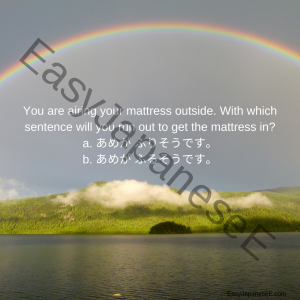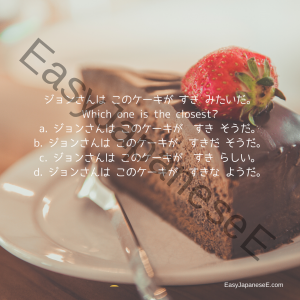
Today’s Grammar Point: ~そうにない/そうもない/そうにもない
~そうにない is used when you describe something that is unlikely to happen. It is a rather objective statement. ~そうもない is similar but I think it has a slightly more subjective feel than ~そうにない, so it is more like “I don’t think … will ~.” ~そうにもない gives the impression that the possibility of something happening is almost nil.
Connections
- [verb stem] + そうにない/そうもない/そうにもない
A verb stem is a ます-form verb without the ending ます
Examples
雨はふりそうにない。
Rain is unlikely.
雨はふりそうもない。
I don’t think it will rain.
雨はふりそうにもない。
I don’t think it will rain at all.
The difference are NOT that big.しばらく日本には行けそうにないから、写真を見て我慢しよう。(Today’s caption)
It’s not likely we can go to Japan for a while, so let’s make do with looking at photos.バスは来そうにないからタクシーで 行こう。
The bus is unlikely to come, so let’s take a taxi.足にケガをしたから、明日は学校に行けそうにない。
It’s unlikely that I can go to school because I hurt my foot.バスには乗れそうもないから、タクシーで 行った。
I didn’t think I could get on the bus, so I went by taxi.大雨でグランドがぬかるんでいるから、 明日の体育祭はできそうもない。
The ground is muddy due to heavy rain, so it seems unlikely that tomorrow’s athletic festival will be held.この本は漢字が多すぎて私には読めそうにもない。
This book has too many kanji characters for me to read.JLPT N1の試験は難しいから、合格しそうにもない。
The JLPT N1 exam is difficult and I think it’s almost impossible for me to pass.
- そう
~そうにみえる

~そうになる/そうになった

~そうな/そうに

~そうです

If you liked this article, please share it with your friends using the social media buttons below. Also, your clicks on ads on this page help covering the cost of running this website. Your support will be much appreciated.





